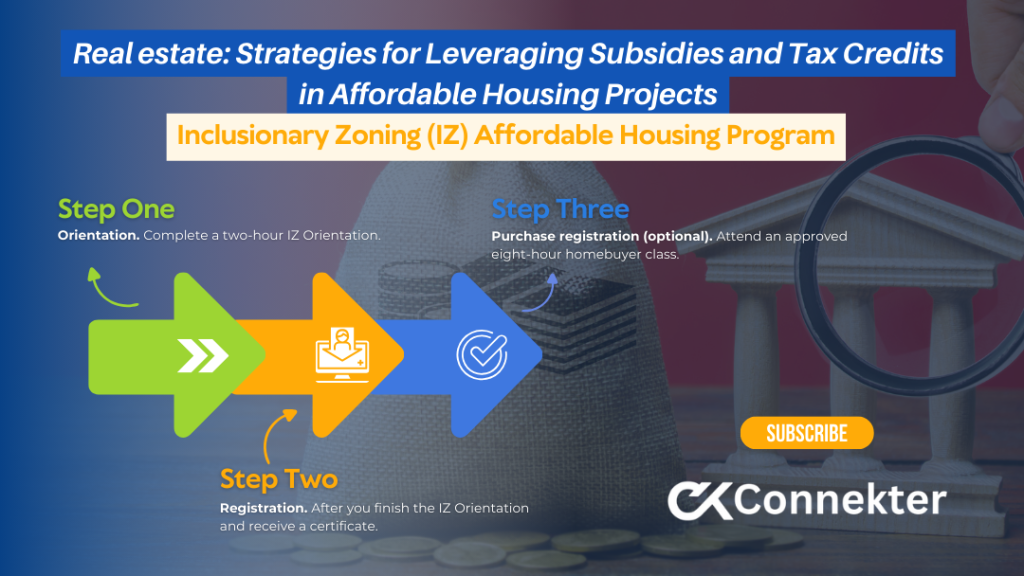
Real estate: How to take advantage of subsidies and tax credits and identify affordable housing opportunities.
How do you view real estate tax credits? Did you know you can use them to your advantage?
As a realtor, you’ve encountered high costs and scarce lending. By this, I mean market rates, of course. Many traditional developers look for opportunities to build affordable housing.
But, this sector depends on several factors. Lending from agencies or community stakeholders, etc. So where’s the opportunity in real estate?
This varies widely. Favorable elements often involve additional and unique challenges. Developers must identify opportune site conditions. And they must also assess prospects to compete for financing. Secure municipal approvals. Gain community support. In short…
They need to complete the project within the required timeframes for the asset to qualify as a good opportunity.
In the midst of all this, what can you do as a realtor?
Keep growing! Stay abreast of all these changes in real estate. This way, you will easily find a good opportunity. Connekter, for example, can help you. This, in different ways. A lead generation platform will keep you active. And, even better, gaining potential customers.
If you want to learn how to identify these opportunities, read on. Here we explore some ways to do just that.
Opportunity strategies in real estate
Well, Affordable Housing in Urban or Suburban Areas?
Urban areas offer greater opportunities for residents to find affordable housing. This is due to easier access to public transportation, jobs, and services. The acquisition price of infill can be high. But these sites often come with area services and connections that can eliminate some costs.
Suburban development can mean lower acquisition prices. Also, building sites free of pre-existing structures. Residents can gain access to valuable school districts and interesting amenities in the area. However, suburban lots can lack infrastructure.
This increases the developer’s cost to provide utilities and street connections. Limited public transportation can present a challenge for residents.
The zoning scenarios that represent the greatest opportunity will vary, depending on the deal and the real estate market.
But informed affordable housing developers generally follow the lead of state agencies, which allocate funding for projects, maximizing tax and construction incentives. Hanfield Curtin, Beacon’s senior development director, says.
Opportunity Zones
Many states designate opportunity zones for affordable housing. In these areas, eligible investments can receive tax breaks to increase the project’s bottom line. They can improve the applicant’s ability to qualify for funding.
“Many states further define the areas in which they want to prioritize affordable housing, and this can become an exclusion issue,” explains Hanfield Curtin.
Inclusionary Zoning in rea
Keep in mind that each project may have different requirements. In exchange for meeting the conditions and depending on the jurisdiction, developers may receive incentives to offset costs.
“These incentives can include expedited permitting, fee reductions, grants, lower land costs, variances, and more,” says Sara Link, senior project manager at Bohler DC.
The District of Columbia, for example… Establishes inclusionary zoning to ensure that new multifamily properties set aside apartments. To rent to residents with varying income levels below the area median income, says Link.
Real Estate: How to align funding opportunities with community needs
Securing funding for affordable housing projects is a challenging process in real estate. Scoring criteria set by funding agencies play a role. The question is, “How do you get the project to the top of the list?” says Hanfield Curtin.
Aligning funding opportunities with specific state or municipal priorities is critical. That’s for a project to be considered. Factors such as urban or suburban locations and opportunity zones play a role. They can affect a project’s competitiveness, though they are not the only considerations. Connekter can help you with this.

Why lead generation in real estate?
First, you’ll gain organic leads, which you can manage without problems. All information will be centralized. Also, segmented.
This data segmentation allows you to prioritize actions and draw up strategies. Why? This is based on the way Connekter collects data. It uses online forms, social media, etc. Thus, it forms a compact digital framework that improves the reach of your business.
The data is segmented according to several criteria. They include location, geographic area and level of interest, for example. This is essential in real estate if you want to stay on top of these opportunities.
Your strategy as a realtor and your relationship with affordable housing is based on this knowledge. In addition, our associated blog will keep you up to date with all the news.
Community engagement is vital in real estate. Developers must reach out to local organizations and residents to gather feedback and incorporate their needs into development plans.
These are just a few elements to consider. The key is not to miss out on any new developments. And rely on a platform that makes your work easier. At the same time, you save time and resources. All without stopping your business and continuing to look for potential clients.
At Connekter, we also work with pre-qualified clients. Which can be an advantage with respect to this economy of resources in real estate.
If you want to connect with us, or explore our tools, write to us. Your results will increase, and we will contact you soon!
Extra resources:
- The Affordable Housing Crisis. https://www.jdsupra.com/legalnews/the-affordable-housing-crisis-2176160/
- Tackling the Affordable Housing Crisis: Challenges and Innovative Solutions. https://activerain.com/blogsview/5852458/tackling-the-affordable-housing-crisis–challenges-and-innovative-solutions
- The Golden Ticket to Real Estate Wealth: Depreciation & Cost Segregation with Eric Oliver

